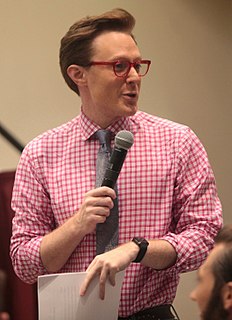A Quote by Neil Gaiman
I had started to feel that somewhere in the second half of the 20th century, the idea of page-turning as a good thing had been lost. You were getting books that were the equivalent of absolutely beautifully prepared dishes of food that didn't taste like anything much.
Related Quotes
Some were getting married; some were getting divorced. People were in different places, but you had enough time on this earth to actually get somewhere, and I think that's the exciting thing about being 36 and in your mid-30s. You've been somewhere, and you're going to go somewhere. It's fun; it's exciting.
I wanted to be an artist after all, and my teachers told me these were the best authors the 20th century had to offer. But these books sucked. They were so boring and sloppy and plotless. And Bob Dylan's lyrics seemed nonsensical to me - almost like he had just gotten high and written down whatever random thoughts occurred to him.
Something I always wanted to do, to capture that later half of the '70s. It's like the early half of the '70s is still the '60s, in that there's still kind of a playfulness and inventiveness in terms of design and the things that were going on in the culture. The second half, it got much more commodified. It's possibly the ugliest era of architecture and clothes and design in the entire 20th century, from 1975 to '81 or '82.
In the 20th century, we had a century where at the beginning of the century, most of the world was agricultural and industry was very primitive. At the end of that century, we had men in orbit, we had been to the moon, we had people with cell phones and colour televisions and the Internet and amazing medical technology of all kinds.
It was the last generation of writers [ the Cheers] that had grown up reading books instead of watching TV. So you weren't getting anything that was derivative of I Love Lucy or Happy Days. You were getting real characters [like those] they read in P.G. Wodehouse or Dickens or somewhere along the line, because they had all grown up with a love of literature.
At the beginning of the 20th century, before the migration began, 90 percent of all African-Americans were living in the South. By the end of the Great Migration, nearly half of them were living outside the South in the great cities of the North and West. So when this migration began, you had a really small number of people who were living in the North and they were surviving as porters or domestics or preachers - some had risen to levels of professional jobs - but they were, in some ways, protected because they were so small.
D-Day represents the greatest achievement of the american people and system in the 20th century. It was the pivot point of the 20th century. It was the day on which the decision was made as to who was going to rule in this world in the second half of the 20th century. Is it going to be Nazism, is it going to be communism, or are the democracies going to prevail?
The other thing that I got back then - the Parker novels have never had much of anything to do with race. There have been a few black characters here and there, but the first batch of books back then, I got a lot of letters from urban black guys in their 20s, 30s, 40s. What were they seeing that they were reacting to? And I think I finally figured it out - at that time, they were guys who felt very excluded from society, that they had been rejected by the greater American world.
More girls were killed in the last 50 years, precisely because they were girls, than men killed in all the wars in the 20th century. More girls are killed in this routine gendercide in any one decade than people were slaughtered in all the genocides of the 20th century. The equivalent of 5 jumbo jets worth of women die in labor each day... life time risk of maternal death is 1,000x higher in a poor country than in the west. That should be an international scandal.



































